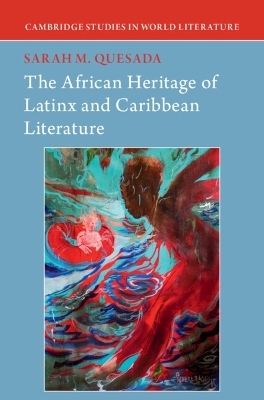
The African Heritage of Latinx and Caribbean Literature
Seiten
2022
Cambridge University Press (Verlag)
978-1-316-51435-1 (ISBN)
Cambridge University Press (Verlag)
978-1-316-51435-1 (ISBN)
Through extensive Romance Languages archival and field research, this book challenges eurocentric notions of World Literature to create a 'Latin-African' literary history that interweaves the influential voices of African, Caribbean, and Latinx/Chicanx authors. This book bridges the long-neglected distance between hemispheric and African studies.
The African Heritage of Latinx and Caribbean Literature unearths a buried African archive within widely-read Latinx writers of the last fifty years. It challenges dominant narratives in World Literature and transatlantic studies that ignore Africa's impact in broader Latin American culture. Sarah Quesada argues that these canonical works evoke textual memorials of African memory. She shows how the African Atlantic haunts modern Latinx and Caribbean writing, and examines the disavowal or distortion of the African subject in the constructions of national, racial, sexual, and spiritual Latinx identity. Quesada shows how themes such as the 19th century 'scramble for Africa,' the decolonizing wars, Black internationalism, and the neoliberal turn are embedded in key narratives. Drawing from multilingual archives about West and Central Africa, she examines how the legacies of colonial French, Iberian, British and U.S. Imperialisms have impacted on the relationships between African and Latinx identities. This is the first book-length project to address the African colonial and imperial inheritance of Latinx literature.
The African Heritage of Latinx and Caribbean Literature unearths a buried African archive within widely-read Latinx writers of the last fifty years. It challenges dominant narratives in World Literature and transatlantic studies that ignore Africa's impact in broader Latin American culture. Sarah Quesada argues that these canonical works evoke textual memorials of African memory. She shows how the African Atlantic haunts modern Latinx and Caribbean writing, and examines the disavowal or distortion of the African subject in the constructions of national, racial, sexual, and spiritual Latinx identity. Quesada shows how themes such as the 19th century 'scramble for Africa,' the decolonizing wars, Black internationalism, and the neoliberal turn are embedded in key narratives. Drawing from multilingual archives about West and Central Africa, she examines how the legacies of colonial French, Iberian, British and U.S. Imperialisms have impacted on the relationships between African and Latinx identities. This is the first book-length project to address the African colonial and imperial inheritance of Latinx literature.
Sarah M. Quesada is an Assistant Professor of Romance Studies at Duke University.
1. Fear: Junot Díaz's zombies and les contorsions extraordinaires in 'Monstro'; 2. Commodification: Badagry and the African safari of Achy Obejas's Ruins; 3. Obliteration: Gabriel García Márquez and his Angolan chronicles of a 'Latin-African' death foretold; 4. Archival distortion: The Chicano-Congo Relación of Tomás Rivera and Rudolfo Anaya.
| Erscheinungsdatum | 21.07.2022 |
|---|---|
| Reihe/Serie | Cambridge Studies in World Literature |
| Zusatzinfo | Worked examples or Exercises |
| Verlagsort | Cambridge |
| Sprache | englisch |
| Maße | 157 x 235 mm |
| Gewicht | 560 g |
| Themenwelt | Geisteswissenschaften ► Sprach- / Literaturwissenschaft ► Anglistik / Amerikanistik |
| Geisteswissenschaften ► Sprach- / Literaturwissenschaft ► Literaturgeschichte | |
| Geisteswissenschaften ► Sprach- / Literaturwissenschaft ► Literaturwissenschaft | |
| ISBN-10 | 1-316-51435-8 / 1316514358 |
| ISBN-13 | 978-1-316-51435-1 / 9781316514351 |
| Zustand | Neuware |
| Haben Sie eine Frage zum Produkt? |
Mehr entdecken
aus dem Bereich
aus dem Bereich
Poetik eines sozialen Urteils
Buch | Hardcover (2023)
De Gruyter (Verlag)
CHF 83,90
Buch | Softcover (2024)
belleville (Verlag)
CHF 27,95


